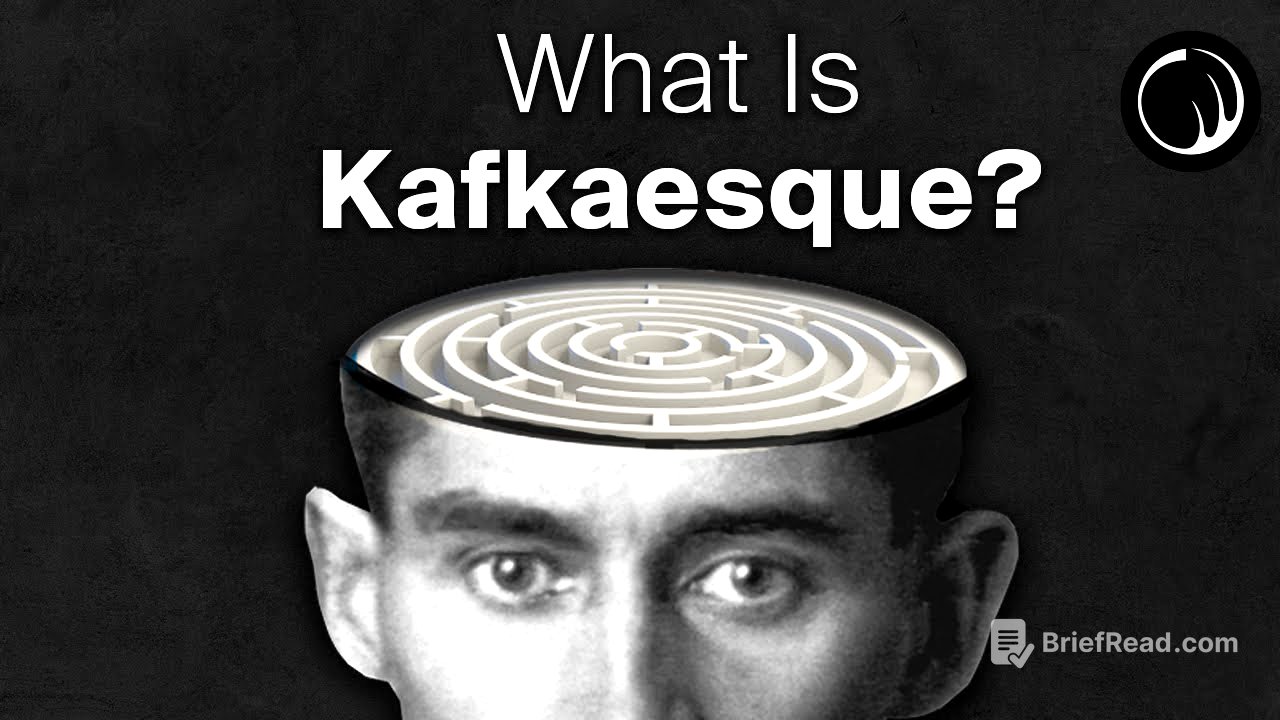TLDR;
This video explores the life and work of Franz Kafka, highlighting his unique writing style known as "Kafkaesque." It examines his difficult upbringing, his struggles with his father, and his experiences in bureaucratic systems, all of which influenced his dark, surreal, and disorienting literary works. The video also discusses the themes present in Kafka's novels, such as "The Trial" and "Metamorphosis," focusing on the confrontation with the absurd and the human desire for understanding in the face of senselessness. Ultimately, it emphasizes Kafka's lasting impact on literature and philosophy, offering a way for readers to confront the darker aspects of the self and the shared human experience of the Kafkaesque.
- Kafka's writing style, "Kafkaesque," reflects dark, disorienting, and surreal themes.
- His difficult relationship with his father and experiences in bureaucratic systems heavily influenced his work.
- Kafka's novels explore the confrontation with the absurd and the struggle for understanding in a senseless world.
- His work provides a means for self-examination and confronting the darker aspects of the human experience.
Introduction to Franz Kafka [0:00]
Franz Kafka is recognized as a major literary figure known for his dark, disorienting, and surreal writing style, which has been termed "Kafkaesque." Understanding his early life is crucial to understanding his writing. Kafka was born in Prague in 1883.
Early Life and Influences [0:20]
Kafka's father, Hermann, was a successful businessman who expected his son to meet his high standards. However, Franz was a small, anxious, and sickly boy, which led to him becoming a disappointment to his father. During his adolescence, Franz turned to writing as a way to cope with his anxiety, guilt, and self-hatred, but his father disapproved and pushed him to study law.
Career and Literary Beginnings [1:16]
While studying law, Kafka continued to write and befriended Max Brod, who later encouraged him to publish his early works, though they were not successful. After college, Kafka worked in a law office and then for an insurance company, where he faced long hours, unpaid overtime, and complex bureaucratic systems, making him miserable. Despite this, he continued to write in his free time, producing some of his most famous works, such as "The Trial," "The Castle," and "America," but he did not publish them, feeling they were unworthy.
Posthumous Recognition [1:59]
Kafka continued to work at the insurance company and write until he died of tuberculosis in 1924 at the age of 41. He never achieved recognition for his work and believed it was no good, even instructing Max Brod to burn his unpublished manuscripts. Brod ignored these instructions and spent years organizing and publishing Kafka's work, leading to Kafka becoming a prominent literary and philosophical figure in the 20th century. Despite living his life feeling inadequate, Kafka's work became immensely important, raising questions about unrecognized potential and unheard voices.
The Essence of Kafkaesque [3:21]
The term "Kafkaesque" generally refers to the bureaucratic nature of capitalistic, judiciary, and government systems, characterized by complex and unclear processes where no one has a comprehensive understanding and the system is indifferent. This quality extends beyond these systems to the reactions of individuals subjected to them. In "The Trial," Joseph K. is arrested without explanation and subjected to an absurd trial filled with corruption, never learning why he was arrested but remaining guilty. In "Metamorphosis," Gregor Samsa wakes up transformed into an insect and faces the problems of getting to work and providing for his family, highlighting his dread and uselessness.
Confrontation with the Absurd [4:50]
Kafka's style centers on the confrontation with the absurd, where characters face inescapable senselessness despite their efforts and reasoning. Success is impossible and pointless, yet they persist. This can be interpreted as Kafka's view of the human condition: the desire for answers and overcoming existential problems like anxiety and absurdity, paired with the inability to understand or control the source of these problems. Despite despairing circumstances, Kafka's characters initially fight against their situations, trying to make sense of the senselessness, though ultimately in vain.
Interpretations and Lasting Impact [6:01]
Kafka may be suggesting that the struggle for understanding is both inescapable and impossible. As rational beings, we fight against absurdity, perpetuating the struggle we are trying to resolve. Kafka's work is open to many interpretations due to its vague and surreal quality. Regardless, Kafka's work has had a lasting impact on literature, philosophy, and humanity, helping readers feel less alone in their experiences.
The Universality of the Kafkaesque [7:06]
Kafka's story, while sad, is not uncommon. Many people experience faulty families, difficult circumstances, or bureaucratic systems, and feel guilt and anxiety for no clear reason. Kafka's work is great because it describes something mundanely common in a profound way, encapsulating an often indescribable experience that touches us all. Anne Rice noted that Kafka's work helped her realize the importance of confronting the darker aspects of self through unhindered self-examination.
The Wish to Continue [8:34]
Kafka's work embodies the wish to continue despite absurdities and problems, to struggle against the universe, and to find and connect over honesty.



![[#벌거벗은세계사] 세계 경제를 흔든 미국의 고관세 정책💵 트럼프가 고관세에 집착하는 이유 '매킨리 관세법'은 무엇인가❓](https://wm-img.halpindev.com/p-briefread_c-10_b-10/urlb/aHR0cDovL2ltZy55b3V0dWJlLmNvbS92aS90NVh5TUJhQ0pfYy9ocWRlZmF1bHQuanBn.jpg)





